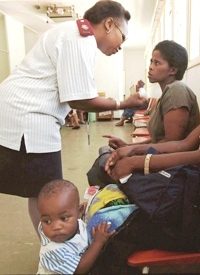
Suppose a nation was so blessed with natural resources that it almost could not be poor. Suppose that this nation led the world in gold and chromium production, that it was second in the world in platinum, zirconium, and manganese production, third in vanadium production, fifth in diamond production, seventh in iron and coal production, and produced large amounts of many other minerals and valuable elements as well.
Now suppose that this nation was also among the most richly endowed agricultural areas in the world — that it produced very large export crops of apples, apricots, pears, lemons, tangerines, grapes, and oranges, and that it also was among the world’s major producers of corn and wheat. Such a land would be even more blessed than Saudi Arabia, because as valuable as oil is today, it is affected by the market price of energy for that single resource.
Suppose also that this nation was one of the most physically beautiful places on earth, with a temperate climate, and that it had one of the best natural harbors in the world located at one the globe’s most traveled maritime routes. That describes the Republic of South Africa. At present, the unemployment rate hovers around 25 percent and half the population lives in poverty. More disturbing has been the South African experiment with socialized medicine. This began soon after the Marxist-leaning African Nationalist Party took over the government in the early 1990s. Public health coverage expanded dramatically, and virtually all children and pregnant women were completely covered by public health care.
The consequences for the people of South Africa have been dreadful, and for the women and children of the country the results have been little short of horrific. The life expectancy in South Africa has plummeted over the last 20 years. From 1958 to 1990, the life expectancy rose steadily from 47 years to 63 years. During the decades since then, it has dropped to the point that it is slightly lower than in 1958. This is in spite of great advances in medical science and much greater public expenditures on health care.
Worst, though, are the horror stories trickling out of the nation, particularly those related to childbirth and infant care. Maternal deaths, according to Human Rights Watch, have quadrupled. The organization interviewed 157 women as well as many nurses and other health care providers. Women reported that nurses cursed at them during childbirth and told them to “shut up” about labor pains. One woman, who waited for 1½ hours at a hospital, was shouted at by a nurse who said that she was “lying about being in labor.” Three hours later the woman gave birth to a stillborn child.
Another woman who went to a community health clinic was told by the nurse than her baby was dead. The woman remained at the clinic, bleeding and untreated for an hour, and when an ambulance arrived to take her to the hospital, she was given no assistance. While still bleeding, the mother had to keep the dead child in her trousers for hours.
Another pregnant woman was insulted by nurses and the doctor who examined her said that she was not even pregnant. She finally persuaded a doctor to operate but the nurses, she said, refused to even change the bandages from her Cesarian section unless she bribed them. The wounds became infected and the woman related her current condition: “I’m 28 years old but I feel like a 50-year-old woman … I don’t know when I will feel young again.”
Pregnant women have been ordered by nurses to mop up their own blood. Nurses and other medical staff have pinched them, slapped them, ignored them, and called them names. Other women in labor are simply turned away at these clinics. In one instance, a woman showed scars along her leg which were reportedly caused by a nurse using scissors to force the pregnant woman to open her legs during labor.
The report exposed three hospitals that had no gloves, no disinfectants, no soap, and no toilet paper. During a brief period in January, 29 infants died at that hospital. This has had an effect upon the decision of South African women to seek medical care before and after pregnancy. Indeed, statistics seem to support the wisdom of mothers in South Africa who avoid public health facilities.
Despite laws that provide free and universal health care to all children and pregnant women, it is becoming extremely dangerous to have a child in South Africa. The report noted that some dead women were found in clinic beds, apparently untreated for long periods of time by medical staff. The maternal mortality rate in South Africa has exploded. It was 150 per 100,000 live births in 1998; but by 2007, the maternal mortality rate had increased more than fourfold to 625 maternal deaths per 100,000 live births. The “woman’s right to choose,” as pro-abortion advocates characterize it, is also enshrined in South African law. Although abortion is often touted as a way to preserve the health of mothers, this has clearly not been the result in South Africa.
Corruption, incompetence, indifference, and other unhappy qualities of mandatory government programs seem to have turned a relatively effective health care system in South Africa into a grim nightmare. Compounding these problems is an exodus of doctors and nurses to other countries where the pay is better. The response of the South African Department of Labour has been to conclude: “it is clear that there is a shortage of doctors in South Africa in both absolute and relative terms,” which requires “urgent measures to recruit doctors and other health professionals back to South Africa.”
What is less clear is what caliber of healers would want to return and practice medicine in South Africa today.
Photo: A nurse, left, explains to patients, right, that abortion procedures are performed only during the week at the Chris Hani-Baragwanath Hospital in Soweto, South Africa: AP Images



